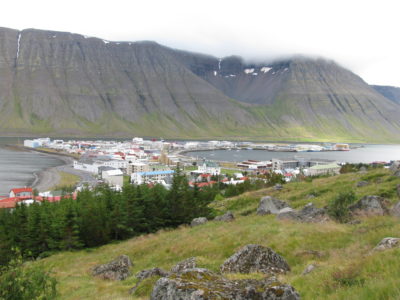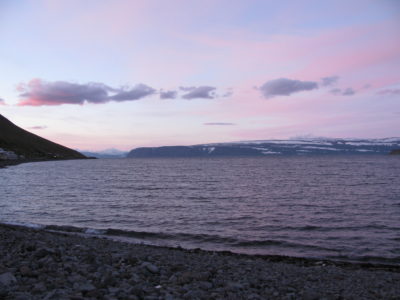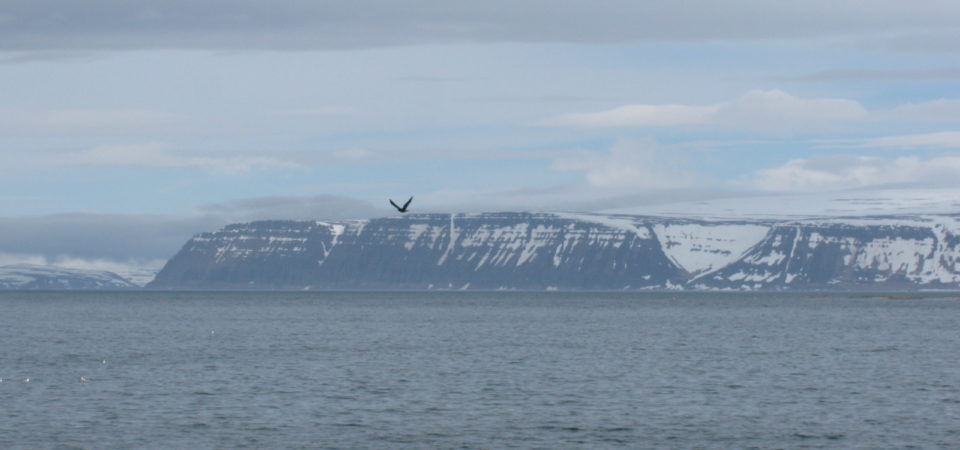Each time I leave Ísafjörður for Reykjavík and then my home in Arizona, I gaze across a blue or gray or green sea the night before I go. Waves roll gently toward the shore or crash onto rocks at my feet, leaving behind the foam of whitecaps whipped by Iceland’s sometimes fierce wind. I recall expanses of open land dressed in summer green, autumn gold or blue-tinged winter white; made majestic by steep mountains, deep fjords and long-drop waterfalls or dramatic by steam vents, mud pots and long-cooled lava flows. Standing beside the sea, I am aware of the village behind me and its history of people and place grown and growing together, co-emergent over time. I wonder again what makes it so hard for me to leave this place. I understand that it is more than the country’s spectacular natural beauty.
Looking back, I remember the many times that Icelanders, young and old, said to me, “No one controls nature,” and, also, the respect for earth, sea and weather that accompany this statement. This respect threads through an extended community of human and other-than-human animals, plants, earth and sea. The unique contribution of each individual, species, and geography is acknowledged tacitly in the still-present habits of care-taking, inclusion and conversation that have made life good across millennia in a remote and often harsh place. The system that supports this is complex, open and inclusive. Democracy and sustainability succeed in on-going co-creation of people and place.
What I miss most when I leave this place is the prevalence, especially in the West Fjords, of such respect, tolerance and inclusion and the sense of agency and responsibility that these engender in individuals and communities. Both are important in the practice of citizenship as Harry C. Boyte defines it in his recent book, Awakening Democracy through Public Work: Pedagogies of Empowerment (Vanderbilt University Press, 2018):
Citizenship itself—not legal status but action for the general welfare, which can include the action of undocumented citizens and refugees who develop capacities and undertake work to build communities—can seem like an echo from the distant past.
Boyte discusses the importance of such public work in creating and maintaining strong, functional democracies. Like many often small and distant places globally, the West Fjords’ remoteness has buffered the manipulative profit motivations and centralized power groups that spread globally with imported or imposed capitalism as practiced by the world’s super powers. For now, a can-and-will-do attitude is still apparent in villages and individuals of the region tempered by the humility and commitment to community that stem from history and placement in a larger, more powerful natural context.

As I remember these attitudes from my 1950s, small town Kansas childhood, I am aware also of their gradual diminishment when economic, political and policy changes shifted understandings of both citizenship and government. Boyte describes this shift as “a loss of civic muscle [that] has been accompanied by the narrowing of government’s role” away from government “of the people, by the people” to government “for the people,” which he defines as delivering services and benefits. He notes that governments are failing under these new responsibilities. Concurrently, people have lost not only political skills, habits and civic concepts but also the institutions and community settings where those capacities develop.
When such capacities and human agency erode, governments and democracies begin to fail. Like Boyte, I have witnessed this across decades of living in a society of dominating capitalism and centralized power centers that gain strength in a largely closed feedback loop. Donella Meadows (Thinking in Systems: A Primer, D. Wright ed., Chelsea Green, 2008) demonstrated that failure is written into such closed systems, and Boyte understands today’s weakening democracies as symptoms of systems failure in government. So, there is another reason that leaving Ísafjörður is hard for me: I know the probability that the same creeping system of one style of capitalism will reach this place as it has so many others globally with disastrous effects for nature, climate, cultures and the human experience. (See Ghosh and Klein.)
Through citizenship expressed as public work, Boyte offers a remedy, a starting point, for reversing this trend; he provides examples and strategies for re-establishing civic action for the greater good. He is careful to point out that there are no final, one-size-fits all solutions. Effective public achievement through citizen action proceeds through acts of co-creation that are open-ended, relational and iterative. Each community, however large or small, must achieve its own solution to the issue(s) of concern within their sphere—whether that results, for example, in school children working with local government agencies and funding sources to build a new playground or Boyte and Public Achievement co-founder, Marie Ström, working with major non-profit funding sources to establish Public Achievement education centers across the United States.
Active in this work since he joined Martin Luther King’s Civil Rights work in the mid-1900s, Boyte is Senior Scholar of Public Work Philosophy at Augsburg College as well as a co-founder of the Public Work Academy. His scholarship in the humanities and his long experience in civic action are apparent in his insights and delineation of processes necessary to public achievement. Rather than divisive public demonstrations and canvassing approaches that pit one group against another, Boyte promotes and practices processes of public achievement that look conflicting goals and priorities squarely in the eye in order to understand central issues and politics behind them. His strategies include gathering facts and details about issues and possible solutions; engaging all sides in civil discourse within intellectual and emotional spaces that are held open for safe, respectful airing of differences; and using such processes to arrive eventually at co-created solutions that either work for all or that all understand as the best resolution for the time being. In the learning of these processes, budding citizens of any age learn or relearn the skills of citizenship in a functional democracy.

From my time in Iceland, I understand that nature (earth and other-than-human animal systems) can be admitted as a fellow citizen in Boyte’s approach to public achievement and, in fact, is consistent with his belief that sustainability and democracy must be linked and strengthened as one culture (“Public Universities, Democracy and the Citizen,” public lecture, Arizona State University, March 20, 2019). Recent weather events, coastal erosion and species extinction demonstrate nature’s agency. We are learning that nature will speak louder and longer until we include her voice as a contributor to citizens’ public work and governments’ responsiveness to this work. When individuals and communities regain and exercise the skills and commitments of citizenship and when all affected parties (including those, like nature, who speak in diverse voices) are included in public work around critical issues, we are positioned for a future characterized by the co-emergence (continuing co-evolution) of nature, citizenship and democracy toward a more sustainable, resilient future that is, in Boyte’s words, open-ended, relational and iterative. Co-creation that admits divergences, honors difference and affords dignity to all members of a community supports this co-emergence.
The present urgency of this is underscored in Danielle Allen’s Our Declaration as quoted by Boyte:
The point of political equality is not merely to secure spaces free from domination but also to engage all members of a community equally in the work of creating and constantly recreating that community…
The best way to avoid being dominated is to help build the world…to help, like an architect, determine its pattern and structure.
The time to join with others and start is now; the place is as near and far as your reach extends.
Jan Stanley is a senior sustainability fellow in the Julie Ann Wrigley Global Institute of Sustainability at Arizona State University. She holds the Doctor of Philosophy degree in counseling psychology with an emphasis on collective and individual human development in socio-historical and ecological context. Her current ethnographic research, initiated in 2013, investigates human affinity with natural place in Iceland’s West Fjords and extends to include the many contextual changes in Iceland that accompanied the rapid expansion of tourism during the research period.
The MAHB Blog is a venture of the Millennium Alliance for Humanity and the Biosphere. Questions should be directed to joan@mahbonline.org
The views and opinions expressed through the MAHB Website are those of the contributing authors and do not necessarily reflect an official position of the MAHB. The MAHB aims to share a range of perspectives and welcomes the discussions that they prompt.
